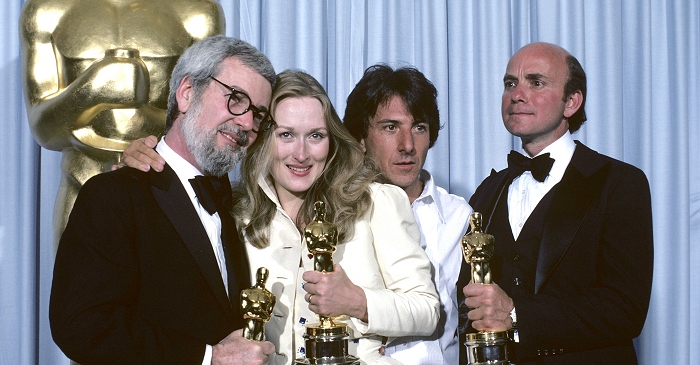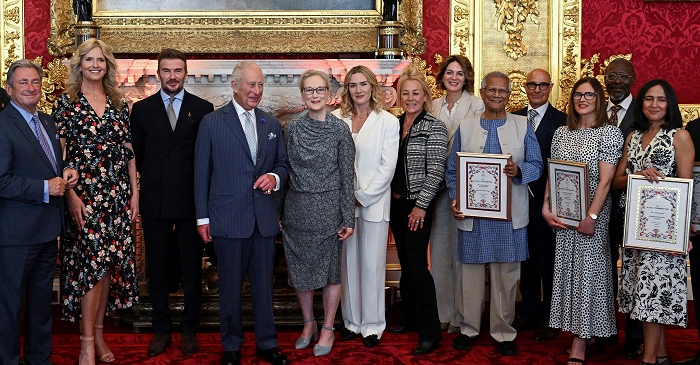|
Simply Streep is your premiere online resource on Meryl Streep's work on film, television and in the theatre - a career that has won her acclaim to be one of the world's greatest living actresses, winning three Academy Awards for "Kramer vs. Kramer", "Sophie's Choice" and "The Iron Lady". Created in 1999, Simply Streep has built an extensive collection over the past 25 years to discover Miss Streep's body of work through thousands of photographs, articles and video clips. Enjoy your stay and check back soon.
|
According to Deadline, Meryl Streep is set to star in Places, Please, a film drama that will be directed by Pulitzer Prize and Tony Award winner Michael Cristofer from a script by UCLA MFA alum Elisabeth Seldes Annacone (The Changing Room). The film is a love letter to Broadway, where both Streep and Cristofer started their careers. In an interview here, they describe their start together on a Broadway performance of Chekhov’s The Cherry Orchard, which figures in the film. Their comments on the stage, and how Broadway can reemerge from its pandemic plight, are included below. Places, Please will shoot this summer in New York, and will be introduced to buyers for the virtual Berlin Market, with CAA Media Finance repping domestic distribution rights and Filmnation handling international sales. Streep, Steven Rogers (I, Tonya) and Jane Rosenthal (The Irishman) will produce. Berry Welsh will executive produce. In the film, Streep will play Lillian Hall, an actress who is synonymous with Broadway. Throughout her long, illustrious career, she has never missed a performance—not for her daughter, not for illness, not for any reason. Yet in the rehearsals leading to her next Broadway production, her confidence is challenged. People and events conspire to take away her ability to do what she loves most. Suddenly, Hall is forced to reckon with the past and the price she has paid for the choices she made in her life and her art. Can she repair a lifetime of parental neglect? Can she reconcile herself to the demands of aging, its real and perceptual debilities? Can she navigate the shoals of self-doubt and loss, the betrayals of others and of her own body? Will she go down in the record books in a blaze of glory? Not without a fight. In explaining the genesis of the film, Cristofer and Streep explain its tie to the launch of each of their stars, and how their sympathy for the unprecedented hardship facing the live theater industry in the pandemic gave this film urgency.
DEADLINE: How much of the motivation for this was the hardship being endured by the theater industry right now and your stage origins?
MICHAEL CRISTOFER: I was sent this original script last November, and it felt like good timing to me, with wonderful potential to create a kind of valentine to the theater. Which is where I came from, when I was 14, 15, 16 years old. I wanted to create a valentine to the people who make theater, especially now, when across the world, theaters are shut down. It triggers something emotional about the past, present, and the people who make art and give their lives to achieve something so beautiful. And what I saw in it went beyond theater, to how theater mirrors life, and everyone who struggles to keep doing what they do in the face of obstacles, physical, social, racial, financial. The script now is a love letter to people who fight to survive, survive and triumph. The world lines up against you, and you fight back.
Curiously in the story of the movie, there is an actress who is struggling to open a production of a play that happens to be The Cherry Orchard by Chekhov. In 1977, Meryl and I were both in a production on Broadway of that play on Broadway, so as I was working on the script I kept thinking, I should just send this to Meryl. She will be too busy, she will have something else to do. I sent it. And now it’s your turn, Meryl.
MERYL STREEP: “I loved it and I thought about that production of The Cherry Orchard. It was at the Vivian Beaumont and it starred the great Irene Worth. That time in the theater was dominated by women who gave everything to their art, like Geraldine Page, Zoe Caldwell and Maggie Smith, Vanessa Redgrave. People who at great sacrifice to themselves, devoted themselves to this impossible thing.
For me, that production was a real jumping off point. We had a blackout in New York, famously, and it happened during the play. The audience was sitting there, all prepped. And they brought out candles and put them on the footlights. And Robert De Niro was in the audience that night, and he saw me in it, and he cast me in The Deer Hunter. And I went from there, and abandoned the theater, for a lot of different reasons. Mostly, for having a lot of children. I don’t know how deep we want to go into this…”
CRISTOFER: Both of us were just beginning. That production gave me a night off because I had my own play opening…
STREEP: It was right across the street…
CRISTOFER: That was Shadow Box [which won Cristofer both the Tony Award and Pulitzer Prize]. That was my jumping off point, right at that same time. I sort of knew that Meryl would respond to this and the character is extraordinary.
STREEP: All of the characters are extraordinary, with what you’ve done with the script. My favorite thing about the theater as opposed to film is that, especially now when I have a very nostalgic ensemble feeling about…when you make a play, you are this group of people so emotionally tied to each other. Film can be a more disjointed thing where people fly in and out, do their thing and leave. Now, with the challenge that Covid has placed before us, people are isolated from each other and there is that feeling, in this piece. The pull of when you become alienated from this group of people with whom you’re working. It’s really pungent in that way.
CRISTOFER: You never really give up the memory of that family, at that time. And besides Irene and Meryl, Raul Julia was in that cast and Mary Beth Hurt. The story of the film is also about what you give up to do what you do, and then you get to later in your life and look back and it’s, what did I miss? A lot of the story is about her character’s relationship with a daughter, who suffered the life of her mother for years and years. And now there’s this sense of time running out. And the characters wants, and tries to recapture a relationship with her daughter. That is a strong part of this.
DEADLINE: Many don’t realize the time commitment that goes into starring in a stage show and it sounds like Meryl that movie making is more conducive to raising a family.
STREEP: I speak with my friends who do that schedule who have children. It’s really hard. You’re gone all weekend, five shows in a row. Friday night, Saturday matinee and evening, Sunday matinee. While they’re home. And when they come home for school most weekdays, you’re off to the theater. I couldn’t figure out a way to make it work, myself. So I didn’t do a play for 25 years until they were older, and really didn’t want anything to do with me.
Theater is much harder. Those are the protean artists, the ones who can make it happen, over and over. There are different challenges in film, from take to take, and shooting out of order, but a play, you live the momentum and there is a galvanizing energy. Even if it’s Tuesday and you just don’t feel like it. Somehow, when the overture comes up in a musical, or you hear the audience in the wings, you get it back.
CRISTOFER: It’s easier to imagine what it’s like if you think of these people as athletes, playing their game and giving their all. But there is nothing like being on stage with a live audience, taking them through a play with a part and a play that speaks and is really good. There are wonderful things that happen, working on film, but it’s a totally different animal.
DEADLINE: The pandemic has been particularly cruel to Broadway. You get financing and cast for a play or musical, and as long as a meteor didn’t hit, you had a shot at something special. Then, bam.
STREEP: That’s a great way to put it, and it’s exactly right.
CRISTOFER: This was worse than a meteor in a way, because if one of those hit, we’d all be gone. We’re here and we can’t do what we want to do. It had a lot to do with [forming] this movie, going through my day and thinking, am I never going to do a play again? You look back at the Plague Years in the 15th Century, some of that went on for four years. We could be in for a prolonged bad spell, if governments don’t get it together.
STREEP: I think the Plague might have gone on for longer, maybe 20 years, encircling Europe. But during two of the worst years, Shakespeare wrote three of his best plays and of course if I knew what I was talking about I would know which ones.
DEADLINE: I spoke recently with Aaron Sorkin. I was thinking the big problem was those theater seats built for thinner, smaller people in the 1930s that put audiences on top of each other. He has a play to mount, and said it probably can’t happen until tourism returns to New York, because Broadway and the stage is the top draw for tourism. You look at the boarded up stores and how Manhattan has been decimated by Covid, and this like live theater has a long road ahead to come back.
STREEP: Lots of us are making big donations to the Actors Fund, at the moment, to help sustain people right through.
CRISTOFER: These are people who don’t have a cushion.
STREEP: Many of them work in the restaurant industry, which is also shut down. It’s brutal.
DEADLINE: This movie is a love letter to that industry. Maybe an encouraging word about the capacity to come back from this terrible time?
CRISTOFER: What you never forget are those days Meryl mentioned, of living on unemployment checks and I think of those doing that and just getting by and doing off and off-off Broadway, and still putting out this extraordinary work. It’s fearful but I think the passion of theater is strong enough that we, it, will survive. I have to believe that. Meryl mentioned Shakespeare’s time, and the theaters were often closed and would reopen and close. The theater did come back and I have to believe it will, again.
STREEP: I graduated from drama school back when New York was broke, in 1975 around the time of that famous headline [Ford To City: Drop Dead]. I was graduating with a lot of student debt, and there were 16 Broadway theaters dark, which had never happened before. Just boarded up and closed. And that’s when Joe Papp started The Public Theater and the Wooster Group and La Mama and all this activity came along on the periphery, driven by young people. Maybe what’s going to happen is, initially, the audience is going to change. It has been largely sustained by older people, but I think there’s such an appetite on the part of young people to get out, experience things and see theater, viscerally, and not on their screens…People are dying to get out and that might be how it morphs for awhile, until it’s safe again for the older people to go.
It’s going to be different, but like Tom Stoppard said, shift your weight. That’s what you have to do. Things change, and the earth moves under your feet. So, shift your weight.
CRISTOFER: It was like, back then, the stream found another way to travel. The Public Theater happened and off Broadway really turned into something special. They operated on a shoestring, but it was young people with a dream.
STREEP: The appetite is there for someone to explain what the world is throwing at us. We need artists to help us figure out what the hell is going on. Right now, I don’t know about you, I’m getting sick of looking at my screen. I want to go somewhere, see something, hear live music. This is our way to embrace all that.












